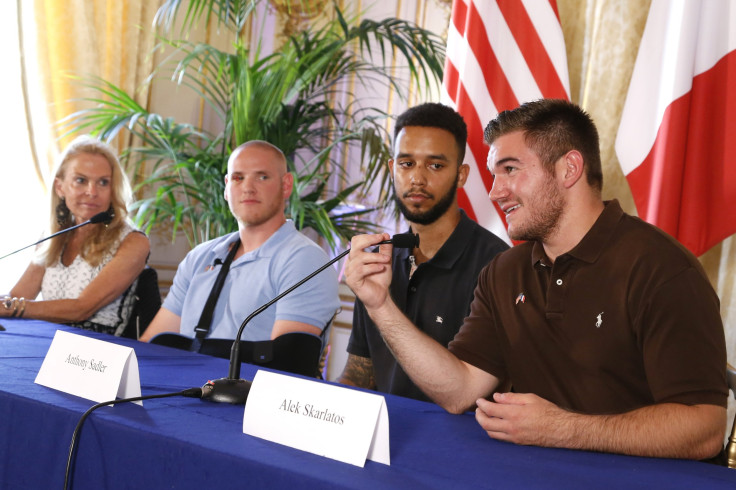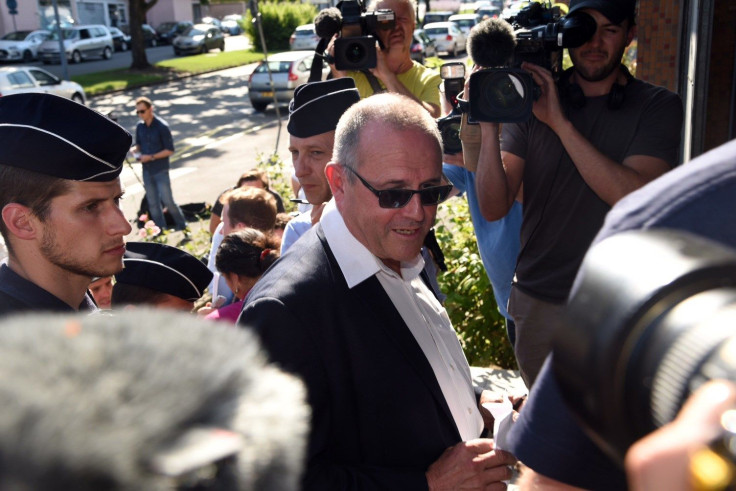French Train Attack: 3 Americans, 1 Briton Receive France’s Highest Honor For Subduing Suspected Terrorist Ayoub El-Khazzani

Update as of 3:43 a.m.: Three Americans and a British man who thwarted an attack on a Paris-bound passenger train in Belgium received France's top honor Monday, the Associated Press reported.
U.S. Airman Spencer Stone, National Guardsman Alek Skarlatos, Anthony Sadler, and a British businessman, Chris Norman, received the Legion of Honor medal from French President Francois Hollande.
Hollande, presenting the award, lauded the men's efforts and said: "Faced with terror, we have the power to resist. You also gave a lesson in courage, in will, and thus in hope," according to reports.
Original story:
Six people responsible for thwarting a presumed terrorist attack on a Thalys passenger train speeding through the French countryside Friday will receive Legion of Honor medals, France’s highest honor. The three Americans and a British citizen who played an instrumental role in subduing the attacker will receive their honors at a ceremony in Paris Monday, AFP reported.
A French citizen who wishes to remain anonymous and an American-born professor identified by the British press as Mark Mooligan, who was shot in the neck by the attacker, will receive their honors at a later date.
The three Americans spoke publicly about the incident for the first time in Paris on Sunday. U.S. Airman Spencer Stone, 23, injured in the melee, said the gunman’s AK-47 "looked like it was jammed and it wasn't working,” a moment that gave the men who subdued him the time needed to react.
“He seemed like he was ready to fight to the end,” Stone said during a press conference at the U.S. Embassy in central Paris. “So were we.”

Stone was slashed in the neck and his thumb nearly sliced off by the suspected terrorist, identified by the Associated Press as Moroccan national Ayoub el-Khazzani, 26, who was on the radar of French, Spanish and Belgian security officials.
Stone, National Guardsman Alek Skarlatos, 22, and their friend, Anthony Sadler, 23, were credited along with British citizen Chris Norman with tackling and hog-tying Khazzani as the train made an emergency stop in Arras, France, near the border with Belgium.
Khazzani was initially confronted by a 28-year-old French banker, who wishes to remain anonymous, and Mark Mooligan, 51, an American professor at the Sorbonne in Paris. Mooligan wrested the rifle away from the attacker, The Telegraph reported. Khazzani responded by shooting Mooligan in the neck with a handgun before taking back the assault rifle. Khazzani then went through an exit at the rear of the car containing a bathroom and standing area. He entered the passenger area of the train where he was confronted by the three Americans and the British citizen.
Stone, his left arm in a sling, told the press Sunday he was sleeping when one of his friends tapped him on the shoulder and said “let’s go.” He turned to see Khazzani apparently struggling with the AK-47. The men tackled Khazzani and choked him unconscious. During the struggle Khazzani slashed Stone in the neck and hand with a box cutter. Stone’s right eye was also damaged.
“We kind of acted,” Skarlatos said. “There wasn’t much thinking.”
Authorities said they believe Khazzani is an Islamic extremist who may have been radicalized while living in the southern Spanish city of Algeciras. Khazzani is being held at a counterterrorism center outside of Paris. He can be held in custody for 96 hours before being charged under French law.
© Copyright IBTimes 2025. All rights reserved.






















